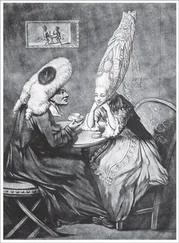Even comparatively minor conditions-a kidney stone, an infected wound, a difficult childbirth-could quickly turn lethal. Almost as dangerous as the ailments were the treatments meted out. Victims were purged with gusto and bled till they fainted-hardly the sort of handling that would help a weakened constitution. In such an age it was a rare child that knew all four of its grandparents.
Many of the exotic-sounding diseases of Shakespeare’s time are known to us by other names (their ship’s fever is our typhus, for instance), but some were mysteriously specific to the age. One such was the “English sweat,” which had only recently abated after several murderous outbreaks. It was called “the scourge without dread” because it was so startlingly swift: Victims often sickened and died on the same day. Fortunately many survived, and gradually the population acquired a collective immunity that drove the disease to extinction by the 1550s. Leprosy, one of the great dreads of the Middle Ages, had likewise mercifully abated in recent years, never to return with vigor. But no sooner had these perils vanished than another virulent fever, called “the new sickness,” swept through the country, killing tens of thousands in a series of outbreaks between 1556 and 1559. Worse, these coincided with calamitous, starving harvests in 1555 and 1556. It was a literally dreadful age.
Plague, however, remained the darkest scourge. Just under three months after William’s birth, the burials section of the parish register of Holy Trinity Church in Stratford bears the ominous words Hic incepit pestis (Here begins plague), beside the name of a boy named Oliver Gunne. The outbreak of 1564 was a vicious one. At least two hundred people died in Stratford, about ten times the normal rate. Even in nonplague years 16 percent of infants perished in England; in this year nearly two-thirds did. (One neighbor of the Shakespeare’s lost four children.) In a sense William Shakespeare’s greatest achievement in life wasn’t writing Hamlet or the sonnets but just surviving his first year.
We don’t know quite when he was born. Much ingenuity has been expended on deducing from one or two certainties and some slender probabilities the date on which he came into the world. By tradition it is agreed to be April 23, Saint George’s Day. This is the national day of England, and coincidentally also the date on which Shakespeare died fifty-two years later, giving it a certain irresistible symmetry, but the only actual fact we have concerning the period of his birth is that he was baptized on April 26. The convention of the time-a consequence of the high rates of mortality-was to baptize children swiftly, no later than the first Sunday or holy day following birth, unless there was a compelling reason to delay. If Shakespeare was born on April 23-a Sunday in 1564-then the obvious choice for christening would have been two days later on Saint Mark’s Day, April 25. However, some people thought Saint Mark’s Day was unlucky and so, it is argued-perhaps just a touch hopefully-that the christening was postponed an additional day, to April 26.
We are lucky to know as much as we do. Shakespeare was born just at the time when records were first kept with some fidelity. Although all parishes in England had been ordered more than a quarter of a century earlier, in 1538, to maintain registers of births, deaths, and weddings, not all complied. (Many suspected that the state’s sudden interest in information gathering was a prelude to some unwelcome new tax.) Stratford didn’t begin keeping records until as late as 1558-in time to include Will, but not Anne Hathaway, his older-by-eight-years wife.
One consideration makes arguments about birth dates rather academic anyway. Shakespeare was born under the old Julian calendar, not the Gregorian, which wasn’t created until 1582, when Shakespeare was already old enough to marry. In consequence, what was April 23 to Shakespeare would to us today be May 3. Because the Gregorian calendar was of foreign design and commemorated a pope (Gregory XIII), it was rejected in Britain until 1751, so for most of Shakespeare’s life, and 135 years beyond, dates in Britain and the rest of Europe were considerably at variance-a matter that has bedeviled historians ever since.
The principal background event of the sixteenth century was England ’s change from a Catholic society to a Protestant one-though the course was hardly smooth. England swung from Protestantism under Edward VI to Catholicism under Mary Tudor and back to Protestantism again under Elizabeth. With each change of regime, officials who were too obdurate or dilatory to flee faced painful reprisals, as when Thomas Cranmer, archbishop of Canterbury, and colleagues were burned at the stake in Oxford after the Catholic Mary came to the throne in 1553. The event was graphically commemorated in a book by John Foxe formally called Actes and Monuments of These Latter and Perillous Days, Touching Matters of the Church but familiarly known then and ever since as Foxe’s Book of Martyrs-a book that would provide succor to anti-Catholic passions during the time of Shakespeare’s life. It was also a great comfort to Elizabeth, as later editions carried an extra chapter on “The Miraculous Preservation of the Lady Elizabeth, now Queen of England,” praising her brave guardianship of Protestantism during her half sister’s misguided reign (though in fact Elizabeth was anything but bravely Protestant during Mary’s reign).
Though it was an age of huge religious turmoil, and although many were martyred, on the whole the transition to a Protestant society proceeded reasonably smoothly, without civil war or wide-scale slaughter. In the forty-five years of Elizabeth ’s reign, fewer than two hundred Catholics were executed. This compares with eight thousand Protestant Huguenots killed in Paris alone during the Saint Bartholomew’s Day massacre in 1572, and the unknown thousands who died elsewhere in France. That slaughter had a deeply traumatizing effect in England-Christopher Marlowe graphically depicted it in The Massacre at Paris and put slaughter scenes in two other plays-and left two generations of Protestant Britons at once jittery for their skins and ferociously patriotic.
Elizabeth was thirty years old and had been queen for just over five years at the time of William Shakespeare’s birth, and she would reign for thirty-nine more, though never easily. In Catholic eyes she was an outlaw and a bastard. She would be bitterly attacked by successive popes, who would first excommunicate her and then openly invite her assassination. Moreover for most of her reign a Catholic substitute was conspicuously standing by: her cousin Mary, Queen of Scots. Because of the dangers to Elizabeth ’s life, every precaution was taken to preserve her. She was not permitted to be alone out of doors and was closely guarded within. She was urged to be wary of any presents of clothing designed to be worn against her “body bare” for fear that they might be deviously contaminated with plague. Even the chair in which she normally sat was suspected at one point of having been dusted with infectious agents. When it was rumored that an Italian poisoner had joined her court, she had all her Italian servants dismissed. Eventually, trusting no one completely, she slept with an old sword beside her bed.
Even while Elizabeth survived, the issue of her succession remained a national preoccupation throughout her reign-and thus through a good part of William Shakespeare’s life. As Frank Kermode has noted, a quarter of Shakespeare’s plays would be built around questions of royal succession-though speculating about Elizabeth ’s successor was very much against the law. A Puritan parliamentarian named Peter Wentworth languished for ten years in the Tower of London simply for having raised the matter in an essay.
Читать дальше
Конец ознакомительного отрывка
Купить книгу












